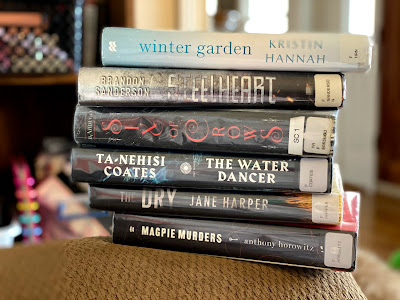
But not the last! :-)
Thanks to the nice folks at Glass Road Public Relations, I am happy to offer a glimpse into Jerome Teel's new book, The Divine Appointment. AND I have a FREE copy of the book to give away!
In The Divine Appointment, Supreme Court Justice Martha Robinson has died, presenting an unprecedented opportunity for conservative president, Richard Wallace, to impact the direction of the highest court in the land for years to come. The Supreme Court has the power to interpret the Constitution, and in the process, to shape the nation. Not everyone is thrilled with the president's nominee, however. And some will stop at nothing, including murder, to prevent his confirmation by the Senate.

About the Author: Jerome Teel received his law degree from the University of Mississippi where he graduated Cum Laude. He now practices full-time as an attorney in Jackson, Tennessee. The Divine Appointment is his second novel.
Interview with the Author:
1. Who is the target audience for The Divine Appointment?
The audience is wide and I believe The Divine Appointment can reach different segments of the Christian community. Specifically, though, I think the target audience is politically active Christians such as members of Christian Alliance organizations, Right to Life Organizations, American Family Association, etc.
2. How do you describe your genre for this book?
Christian fiction political thriller.
3. Where/How did you birth the idea for this book? How did it come about?
The idea for this book was two-fold. First I think that Roe v. Wade was a very bad decision and it should be reversed. Secondly, the appointment and confirmation processes for Justice Roberts and Justice Alito were very intriguing and I wondered what it would be like if there was a true conservative, Christian jurist going through that process who would openly say that Roe v. Wade should be overturned. I found that concept very intriguing and turned it into a storyline.
4. What sort of research was involved to make The Divine Appointment sound authentic/realistic?
I researched the Washington D.C. geography to make sure I had names of buildings and streets accurate. Google Earth is an amazing tool. The legal aspects of the book and the courtroom scenes come from my many years of experience as an attorney.
5. What takeaway points do you hope the reader pulls from this book?
I hope that readers will realize that it is important for Christians to be part of the political process.
6. Is The Divine Appointment part of a series?
It is not designed as a series yet. However, like The Election there could be follow-up books that would track some of the characters.
7. How do you deal with your other obligations (job, family, church, etc.) when it's crunch time near deadlines?
This is one of my most difficult tasks. I'm a partner in a law firm and that is a full-time job. Part of my practice is that I represent the local county government, which at times is very consuming. Currently I am helping coach three separate baseball teams. I am the incoming board president for a local charity. I teach a high school boys' Sunday School. And our family life is extremely busy. As you can see, there are very few unoccupied minutes in my life. When I'm working on a writing project my writing time is very late at night--typically from 10:00 p.m. to about 1:00 a.m. When a deadline is rapidly approaching I have to take time away from the office and stay at home until I'm able to get the project completed.
8. Do you plan character development and then let them run with the story, or do you plot the story in advance?
I don't know how unique my writing style is but I cannot write from an outline. The first thing that happens is that I see the beginning of a story and the end of the story, and then I begin to write. I outline as I go along and I keep a timeline. The characters begin to take on lives of their own and lead me through the story. When I get to about 30,000 words I begin to fully see the story unfold. It is at that point that I make a few notes about the direction of the book and it is all I can do to write fast enough to complete the manuscript.
9. Do you have an organized office and set times to write, or do you find yourself writing at unusual times or places?
I write at unusual times--typically very late at night. But the place is always the same. I have a study in my house and I do all of my writing there.
Thanks, Jerome, for giving us a glimpse at your life as a writer, and why you wrote The Divine Appointment.
As a fan of John Grisham myself, I can't wait to read this book. If you are interested in receiving a FREE copy of The Divine Appointment, leave me a comment by midnight (Central), Sunday, June 17th. I'll draw the winner's name Monday morning and post it! (FYI, anonymous comments will not be entered for the free book).














